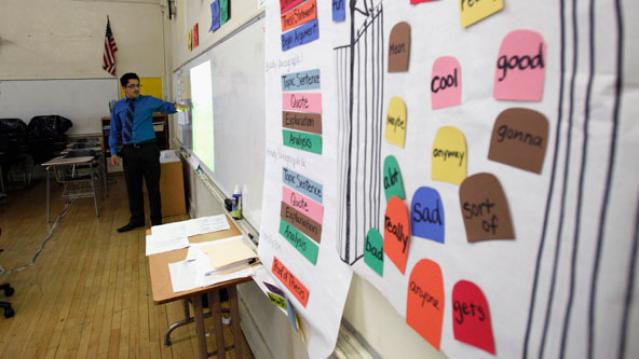Why We’re Wasting Billions on Teacher Development

School districts spend an average $18,000 per year on teacher development, and teachers devote about 10 percent of their time to professional learning, but a new report finds that such programs may not be producing any measurable results.
The report, released today by TNTP, a nonprofit aimed at addressing educational equality, finds even with development programs, teachers do not show much improvement year over year, and the performance for the vast majority (70 percent) remained constant or declined over the past two to three years.
The report’s authors believe the lack of improvement stems from low expectations for teacher development and performance, and they suggest that schools need to rethink completely the ways that they measure teacher performance and the way they conduct student development.
Related: The Education Department Is Failing Students Who Got Defrauded
The study evaluated information on more than 10,000 teachers at three large school districts and a charter network covering nearly 400,000 students.
The authors report that teachers who do show improvement do not appear to be the result of deliberate, systemic efforts, and show no clear patterns that could improve development for others. “The absence of common threads challenges us to confront the true nature of the problem,” they write. “That as much as we wish we knew how to help all teachers improve, we do not.”
Rather than offer specific solutions, the authors suggest that schools redefine professional development, re-evaluate professional learning programs, and reinvent the ways they support teachers.
Top Reads from The Fiscal Times:
- Teens Are Having Much Less Sex Than Their Parents Did at That Age
- The 2016 Presidential Election Is Already a Dumpster Fire
- You’re Richer Than You Think. Really.
Will Trump's Tax Cuts Really Happen? Economists Are Surprisingly Optimistic
Despite all the thorny questions swirling around President Trump's nascent tax reform plan, 29 of 38 economists surveyed by Bloomberg in a monthly poll said they expect Congress to cut taxes by November of next year.
The hitch: The economists don’t expect the cuts will help the economy much. The median projection of a larger group of 71 economists is for 2018 growth of 2.3 percent, up only slightly from 2.1 percent this year — and by 2019, the economists see growth slipping back to 2 percent.



